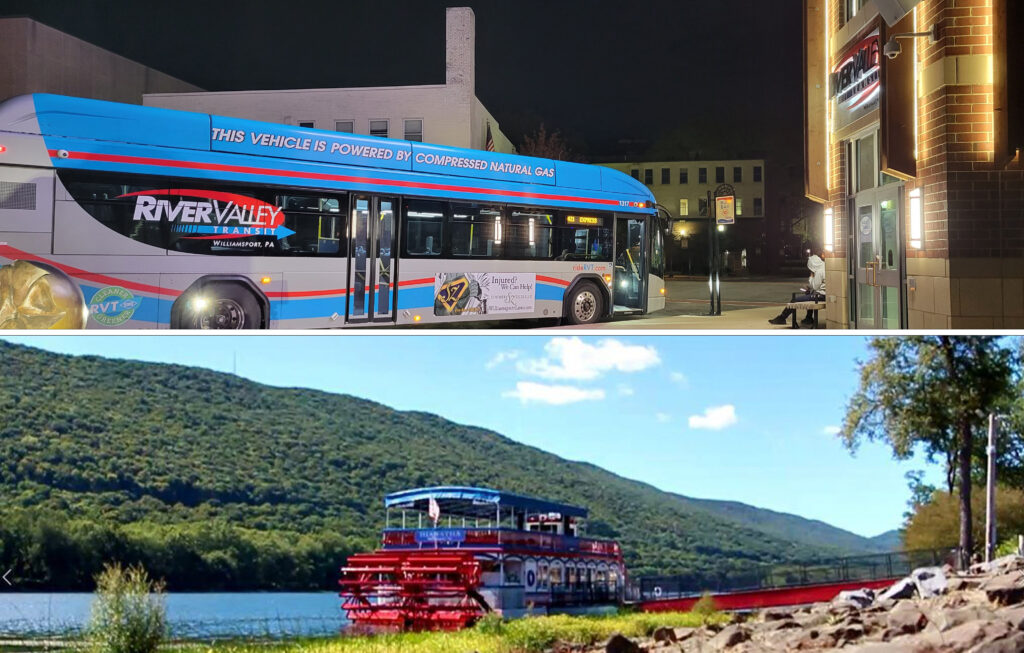
As the City of Williamsport’s finances continue to receive scrutiny from various audits and a state attorney general investigation, it’s alleged that state transportation grant funds may have been sent by River Valley Transit to subsidize Hiawatha Inc. – a popular paddlewheel boat and registered nonprofit.
In what could be seen as a significant conflict of interest, then RVT manager and city finance director William E. Nichols Jr. and current RVT manager Nicole Farr have been listed as employees of the Hiawatha since at least 2016 – both receiving annual compensation.
A letter sent in May 2021, from PennDOT to city General Manager Adam Winder, called for the city to stop using state transportation grant funds for projects outside the scope of city transportation, which included the Hiawatha, an independent nonprofit organization used mainly for tourism and river cruises.
“PennDOT understands that RVT provided a loan to Hiawatha Inc. that may have included public transportation funds. RVT must make every effort to recover the past due debts owed to (PennDOT) as soon as possible,” said Jennie A. Granger, Deputy Secretary Multimodal Transportation, in the letter.
It’s unclear how much money RVT loaned to the Hiawatha as there is no record of this alleged financial transfer in RVT’s budget documents. A recent audit of RVT’s financial records shows significant discrepancies and comingling within the city bank account making it unclear what funds were sent to which organizations.
From 2016 to 2018, the Hiawatha reported that Nichols and Farr worked five hours each week for the Hiawatha – Nichols receiving between $6,800 and $7,800 per year and Farr receiving $4,200 and $5,200 each year.
Nichols has been listed as the nonprofit’s operations manager and Farr as its chief financial officer. It’s unclear if either Nichols or Farr still work at the Hiawatha as the nonprofit has not published additional tax paperwork since 2018.
Nichols control over the city finances and allegations of misappropriation of state and federal grant funds, present his role at the Hiawatha as a conflict of interest, according to Jason Fitzgerald, president of Penn Strategies, a statewide municipal consulting firm focusing on grant writing and municipal management.
“The fact that Nichols was paid by the Hiawatha, River Valley Transit, and Endless Mountains Transportation Authority, all while still directing the City Budget, is highly irregular and would seem to present a pretty clear conflict of interest,” Fitzgerald said.
Efforts to get in touch with the Hiawatha’s current management were unsuccessful through both the phone number on the website, which is disconnected, or the contact form.
“The definition of a conflict of interest is “a situation in which a person is in a position to derive personal benefit from actions or decisions made in their official capacity,” Fitzgerald said.
“Mr. Nichols was preparing the City budget, which impacted RVT, the Hiawatha, and EMTA, and asking City vendors to contribute private funds to the Hiawatha, all while receiving compensation from the Hiawatha, RVT, and EMTA. Pretty outrageous when you think about it,” he said.
In 2018, the Hiawatha’s 990 IRS tax exemption form records it receiving $176,152 in gifts, grants or membership fees. In addition to ticket sales, the Hiawatha receives funds through bingo games, private donations and local fundraising campaigns such as Raise the Region. In early 2021, the Lycoming County commissioners agreed to provide $100,000 to the nonprofit.
The Hiawatha compensation for Nichols and Farr also is recorded within the City of Williamsport’s financial records. Both also received a salary through RVT and additional annual compensation from the Endless Mountain Transportation Authority.
“There could be a potential conflict of interest there that may not be appropriate,” said city Councilman Adam Yoder, who also serves on the city finance committee. “It should not be happening anymore. If it is happening it’s very concerning.”
While Yoder was not a councilman prior to 2019, he said City Council is limited as to what it can do with such matters. While council can conduct investigations into departments, it can’t subpoena individuals or fire employees. This would be up to the city mayor and his administration.
City Council does approve the annual budget and salaries each year, which includes salaries for RVT employees.
City Mayor Derek Slaughter, who took office in 2020, said that the city has adhered to every requirement of PennDOT and that grant funds are currently going only to transportation-related projects.
After filing a Right-to-Know request, On the PULSE received records of the salary and compensation paid to both Nichols and Farr from 2016 to 2021.
From 2016 to 2019, Nichols received an annual salary from the City of Williamsport of ranging from $113,700 in 2016 to $129,000 by 2019. He received an additional $35,000 per year for a line item labeled EMTA (Endless Mountain Transportation Authority).
The Endless Mountain Transportation Authority in Bradford County is managed by River Valley Transit. According to city Mayor Derek Slaughter, RVT is contracted for a certain amount of work with EMTA.
From 2016 to 2019, Farr was paid a full-time salary with the city of $87,300 in 2016 to $86,000 by 2019. She also received roughly $35,000 per year from EMTA between 2016 to 2019.
Nichols was fired from the city in early 2020 shortly after Slaughter took office. In addition, the city financial records show that Farr’s annual salary was reduced to $81,500 and she stopped receiving additional compensation from the Hiawatha line item. Her allocation for EMTA work also was decreased to $20,800 per year.
Williamsport and RVT’s financial practices have come under extensive scrutiny since 2020 when an investigation was started by state Attorney General Josh Shapiro.
In March, the auditing firm Baker Tilley said it would be terminating its relationship with the city.
This spurred the city to contract with RKL, an auditing and accounting firm in Pennsylvania, to investigate River Valley Transit’s 2019 to 2020 finances. The audit uncovered an ongoing pattern of misappropriation of funds, misuse of state and federal grant monies and a failure to meet local match requirements for various grants.
An additional audit of the city’s finances for 2019 and 2020 is underway by Zelenkofske Axelrod. After beginning the audit, the firm informed City Council it would need to increase the original contract amount because the state of the city’s finances was more dire than originally anticipated, and senior accountants would need to be brought in.
It’s unclear when the city audit will be finished, according to Slaughter.




